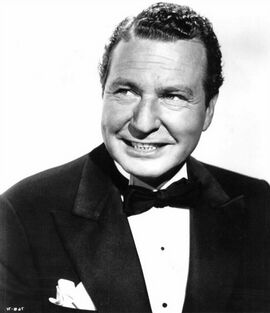Phil Harris
| Phil Harris | ||
 Harris in 1956 | ||
| Background information | ||
| Born as: | Wonga Philip Harris | |
| Born | Jun 24, 1904 Linton, Indiana, U.S. | |
| Died | Aug 11, 1995 - at age 90 Rancho Mirage, California, U.S. Heart attack at age 91 | |
| Spouse(s): | Marcia Ralston (1927 - 1940) divorced Alice Faye (1941 - ) | |
| Children: | 3 | |
| Occupation: | Actor, comedian, musician, songwriter | |
| Years active | 1933–1991 | |
| Nationality: | American | |
Wonga Philip Harris (✦June 24, 1904 – †August 11, 1995) was an American actor, comedian, musician and songwriter. He was an orchestra leader and a pioneer in radio situation comedy, first with The Jack Benny Program, then in The Phil Harris-Alice Faye Show in which he co-starred with his wife, singer-actress Alice Faye, for eight years. Harris is also noted for his voice acting in animated films. As a voice actor, he played Baloo in The Jungle Book (1967), Thomas O'Malley in The Aristocats (1970), Little John in Robin Hood (1973), and Patou in Rock-a-Doodle (1991). As a singer, he recorded a #1 novelty hit record, "The Thing" (1950).
Early life and career
Harris was born in Linton, Indiana, but grew up in Nashville, Tennessee, and identified himself as a Southerner. His hallmark song was "That's What I Like About the South." He had a trace of a Southern accent and in later years made self-deprecating jokes over the air about his heritage. His parents were circus performers. His father, a tent bandleader, gave him his first job as a drummer with the circus' band.
His unusual first name "Wonga," is said to derive from a Cherokee word meaning "messenger of fleet" or, perhaps more accurately translated, "fast messenger."
Harris began his music career as a drummer in San Francisco, in the mid-1920s playing drums in the Henry Halstead Big Band Orchestra. He formed an orchestra with Carol Lofner in the latter 1920s and started a long engagement at the St. Francis Hotel. In the 1930s, Lofner-Harris recorded swing music for Victor, Columbia, Decca, and Vocalion. The partnership ended by 1932, and Harris led a band in Los Angeles for which he was the singer and bandleader.
In 1933, he made a short film for RKO called So This Is Harris!, which won an Academy Award for best live action short subject. He followed with a feature-length film, Melody Cruise. Both films were created by the same team that produced Flying Down to Rio, which started the careers of Fred Astaire and Ginger Rogers. He also starred in I Love a Bandleader (1945) with Leslie Brooks. Here he played a house painter who gets amnesia, then starts to lead a band. He recorded "Woodman, Spare That Tree" (by George Pope Morris and Henry Russell) in 1947. His nickname was "Old Curly." In 1950, Harris recorded a hit novelty song entitled "The Thing," which did hit number 1 on the charts. Additionally, he appeared in The Wild Blue Yonder (a.k.a. Thunder Across the Pacific) (1951), alongside Forrest Tucker and Walter Brennan. He made a cameo appearance in the Warner Bros. musical, Starlift, with Janice Rule and Dick Wesson, and was featured in The High and the Mighty with John Wayne in 1954.
Radio
- Wikipedia article: Phil Harris Radio
Later career
Harris spent time in the 1970s and early 1980s leading a band that appeared often in Las Vegas, often on the same bill with bandleader Harry James.
Personal life
On September 2, 1927, he married actress Marcia Ralston (then known as Mascotte Ralston) in Melbourne, Australia, where his band had a long engagement. The couple adopted a son, Phil Harris Jr. (born 1935). Harris and Marcia divorced in September 1940.
Harris and Alice Faye married in 1941; it was a second marriage for both (Faye had been married briefly to singer-actor Tony Martin) and lasted 54 years, until Harris's death. Harris engaged in a fistfight at the Trocadero nightclub in 1938 with RKO studio mogul Bob Stevens; the cause was reported to be over Faye after Stevens and Faye had ended a romantic relationship.
A Democrat, he supported the campaign of Adlai Stevenson during the 1952 presidential election.
Harris was a lifelong friend of singer and actor Bing Crosby. He appeared on telecasts of Bing's Pro-Am Golf Tournament from Pebble Beach, California, and appeared in an episode of ABC's short-lived sitcom The Bing Crosby Show. After Crosby died in 1977, Harris replaced him as commentator for the annual Bing Crosby Pro-Am Golf Tournament.
Harris was a resident and benefactor of Palm Springs, California, and was active in many local civic organizations.
Death and legacy
Harris died of a heart attack at age 91 in his Rancho Mirage home in the night of August 11, 1995. He is interred at Forest Lawn Cemetery, Cathedral City, California.
Harris was a benefactor of his birthplace of Linton, Indiana, establishing scholarships in his honor for promising high school students, performing at the high school, and hosting a celebrity golf tournament in his honor every year. Harris and Faye donated most of their show business memorabilia and papers to Linton's public library. Harris was inducted into the Indiana Hall of Fame.
In 1994, a Golden Palm Star on the Palm Springs Walk of Stars was dedicated to him.
External links
- Phil Harris at the Internet Movie Database
- Phil Harris 1988 Interview with Chuck Schaden
- Phil Harris Interview NAMM Oral History Library (1985)
- Phil Harris @ Find A Grave
- Wikipedia article: Phil Harris
| Note: Phil Harris was a volunteer at the Hollywood Canteen |
Chat rooms • What links here • Copyright info • Contact information • Category:Root